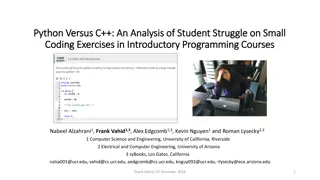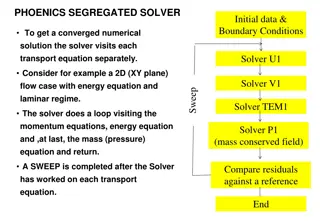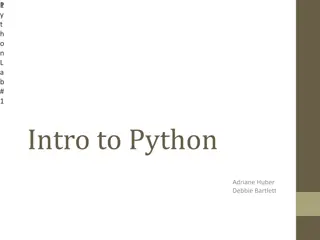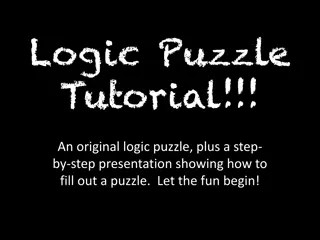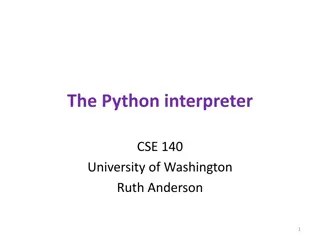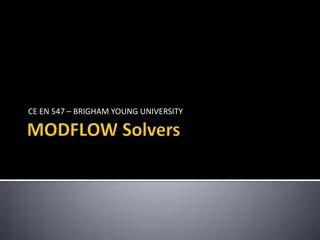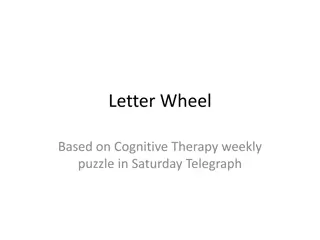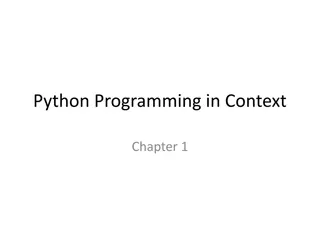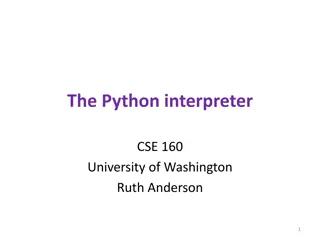Eight Puzzle Solver Implementation in Python
Explore a simple implementation of an eight puzzle solver in Python using the A* algorithm with three different heuristics (nil, out of place tiles, Manhattan distance). The implementation involves modeling states, defining legal actions, determining state transitions based on actions, and utilizing various heuristics to solve the eight puzzle efficiently.
Download Presentation

Please find below an Image/Link to download the presentation.
The content on the website is provided AS IS for your information and personal use only. It may not be sold, licensed, or shared on other websites without obtaining consent from the author. Download presentation by click this link. If you encounter any issues during the download, it is possible that the publisher has removed the file from their server.
E N D
Presentation Transcript
8 puzzle in python Look at a simple implementation of an eight puzzle solver in python p8.py Solve using A* with three different heuristics NIL: h = 1 OOP: h = # of tiles out of place MHD: h = sum of manhatten distance between each tile s current & goal positions All three are admissible
What must we model? A state Goal test Actions Result of doing action in state Heuristic function
Representing states and actions Represent state as string of nine characters with blank as * E.g.: s = '1234*5678' Position of blank in state S is > s.index('*') 4 1 2 3 4 * 5 6 7 8 Represent an action as one of four possible ways to move the blank: up down right left
Legal Actions def actions8(s): # returns list of legal actions in state s action_table = { 0:['down', 'right'], 1:['down', 'left', 'right'], 2:['down', 'left'], 3:['up', 'down', 'right'], 4:['up', 'down', 'left', 'right'], 5:['up', 'down', 'left'], 6:['up', 'right'], 7:['up', 'left', 'right'], 8:['up', 'left'] } return action_table[s.index('*')] 0 1 2 3 6 4 7 5 8 Function maps a position to a list of possible moves for a tile in that position
Result of action A on state S def result8(S, A): blank = S.index('*') # blank position if A == 'up': swap = blank - 3 return S[0:swap] + '*' + S[swap+1:blank] + S[swap] + S[blank+1:] elif A == 'down': swap = blank + 3 return S[0:blank] + S[swap] + S[blank+1:swap] + '*' + S[swap+1:] elif A == 'left': swap = blank - 1 return S[0:swap] + '*' + S[swap] + S[blank+1:] elif A == 'right': swap = blank + 1 return S[0:blank] + S[swap] + '*' + S[swap+1:] raise ValueError('Unrecognized action: ' + A)
Heuristic functions class P8_h1(P8): """ Eight puzzle using a heuristic function that counts number of tiles out of place" name = 'Out of Place Heuristic (OOP) def h(self, node): "" OOP 8 puzzle heuristic: number of tiles 'out of place' between a node's state and the goal""" mismatches = 0 for (t1, t2) in zip(node.state, self.goal): if t1 != t2: mismatches =+ 1 return mismatches
Path_cost method Since path cost is just the number of steps, we can use the default version define in Problem def path_cost(self, c, state1, action, state2): """Return cost of a solution path that arrives at state2 from state1 via action, assuming cost c to get up to state1. If problem is such that the path doesn't matter, this function will only look at state2. If the path does matter, it will consider c and maybe state1 and action. The default method costs 1 for every step in the path.""" return c + 1
How can we test this? Need solvable test problems that aren t too hard Recall that the state space has two disjoint sets! Idea: take a random walk of N steps from the goal Resulting state is solvable in N moves Ensure random walk has no loops for a good test What metrics can we use to compare heuristics? # of states generated, # of states expanded, effective branching factor (efb), and run time
Example Generate tests of different distances from *12345678 15 steps: 4*3275681 => *12345678 19 steps: 4258361*7 => *12345678 Solve using three heuristics, collect data heuristic used solution length states generated successors computed effective branching fac. runtime in seconds NIL 15 14,386 5,173 1.77 5.47145 OOP 15 761 283 1.46 0.02097 MHD 15 87 31 1.26 0.00086 NIL 19 78,872 28,567 1.72 159.1051 OOP 19 3,906 1,457 1.47 0.4217 MHD 19 499 185 1.32 0.1238
P8 Problem on Colab See our collection of AI notebooks on Colab and the code and data in our repo P8.ipynb which uses p8.py and search.py Graphical user interface, text, application, email Description automatically generated





